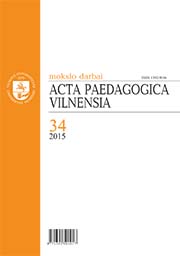Būti priimtam ar būti matomam: kultūrinio susidūrimo kompleksiškumas vykdant tarpkultūrinį ugdymą
Being seen or being accepted: the complexity of cultural encounters in intercultural education
Author(s): Sandra KairėSubject(s): Education, Social Philosophy, Cultural Anthropology / Ethnology, Sociology of Culture
Published by: Vilniaus Universiteto Leidykla
Keywords: intercultural education; cultural encounter; intrusion; alienation;
Summary/Abstract: The paper deals with the importance of cultural encounters in intercultural education. The author argues that even though the acquisition of theoretical knowledge about other cultures is a significant component of intercultural education, a direct cultural encounter is an essential component in the intercultural learning. Therefore, an educator should create conditions for learners from different cultures to interact with each other and learn from these cultural encounters. To achieve this goal, an educator needs to have a deep and a thorough understanding of the cultural encounter phenomenon. While analyzing the ideas of the philosophers Jean-Luc Nancy and Bernhard Waldenfels, the paper reveals the complexity of cultural encounters. Cultural encounters can be experienced in different ways: on the one hand, a foreigner can be accepted and recognized; on the other hand, he or she can be seen as an intruder (Jean-Luc Nancy’s perspective) or an alien (Bernhard Waldenfels’ perspective). Moreover, cultural encounters can be of a contradictory nature. When someone is seen as an intruder or an alien, he or she can retain his or her cultural identity and authenticity, but then he or she remains a foreigner in the new environment he or she chooses to live in. According to Jean-Luc Nancy, when a foreigner wants to be accepted and recognized, at the same time he or she becomes invisible, and this inevitably leads to the process of assimilation. As it is difficult to avoid these contradictions of cultural encounters, an educator should take into account the complexity of every cultural encounter in the educational process. Moreover, it is important to stress that an educator should understand every cultural encounter – being seen or being accepted – to be valuable in itself
Journal: Acta Paedagogica Vilnensia
- Issue Year: 2015
- Issue No: 34
- Page Range: 9-19
- Page Count: 11
- Language: Lithuanian

